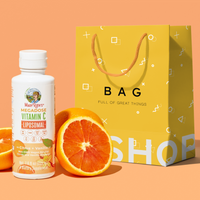
FEATURED
BY COLLECTION
FIND MARYRUTH'S IN STORE!

STORE LOCATOR
Now you can find your all-time faves and discover some exciting new products while you're out shopping.
GET STARTEDZinc is an essential nutrient that plays an important role in immune function, skin health, and more. You can get zinc from dietary sources – some plant-based foods and many animal-derived foods contain zinc – or from supplements.
Your body doesn’t naturally produce zinc on its own – it’s a mineral, which means it’s an inorganic substance that plants and animals don’t produce – so you’ll need to include it in your diet via food or zinc supplements.
Zinc is found in high amounts in many animal products. It’s one mineral that some vegans may struggle to get enough of from dietary sources, which makes a zinc supplement a great idea for plant-based eaters.
However, although zinc is rarer in plant-based foods, there are still several reliable vegan sources of this important mineral. They include:
Some plant-based sources of zinc will only give you a nominal amount of your daily recommended value.
Since zinc is less abundant in a vegan diet than in a diet that contains animal products, taking a zinc supplement each day is an excellent choice to keep from developing a deficiency.
The recommended daily intake of zinc for adults is 8 mg for women and 11 mg for men. Zinc can also be safely given to infants and children in liquid form. The recommended daily value for infants and children is around 3 mg.
MaryRuth’s liquid zinc drops contain 11.25 mg of zinc per serving. Our infant's liquid zinc contains 1 mg of zinc per serving, and our toddler liquid zinc contains 3 mg of zinc per serving.
Taking too much zinc can cause uncomfortable side effects in some cases. However, these side effects are uncommon if you stay relatively around the recommended daily amount of zinc each day. Although higher doses of zinc can be safe, they are more likely to cause side effects, which can include:
If you’re taking high doses of zinc and experiencing any of these symptoms, it’s important to lower your intake immediately. It’s difficult to get anywhere near an unsafe amount of zinc from dietary sources of the mineral, but supplements can quickly add up when you take them in high doses.
Generally speaking, one dose of a zinc supplement and some zinc-rich foods is enough to get all of the zinc you need for a day.
A zinc deficiency can cause numerous problems for your health. Some of the symptoms of zinc deficiency are just mildly uncomfortable, but others can pose serious threats to your overall well-being.
Below are some of the most common signs of a zinc deficiency.
If you are experiencing hair loss and are unsure of its cause, talk to your doctor. They can help you rule out other potential causes and determine whether a nutrient deficiency is contributing to your hair loss. If your hair loss is nutrient-related, your doctor will likely recommend that you add more zinc-rich foods to your diet or start taking a supplement.
If you have gastrointestinal problems caused by other health problems, you may end up with a zinc deficiency as a result.
In most cases, a zinc deficiency can be treated by simply adding more zinc into your diet. Zinc-rich foods and zinc supplements can both be used to get your levels of the nutrient back to normal.
Many of your cells depend on zinc to stay healthy and strong. Healthy, strong cells can successfully proliferate – proliferation is the process by which cells multiply, producing two daughter cells.
When you aren’t getting enough zinc through supplements and dietary sources, your immune system can suffer as a result. The cells within your immune system cannot function properly without zinc, and taking a high-quality zinc supplement is one of the best ways to prevent your immune system from getting compromised.
One of the most important groups of cells within your immune system are macrophages. These cells help your immune system fight off harmful bacteria, which can cause you to get sick. When your zinc levels are too low, your immune system's production of macrophages can be compromised.
Your skin cells are full of zinc. For your skin to stay healthy, you’ll need to maintain proper zinc levels by getting enough of the mineral through your diet and supplements. When you get adequate amounts of zinc from food and supplements, you’re taking an important step in caring for your skin.
If you’re frequently dealing with diarrhea and other gastrointestinal issues, you may have a zinc deficiency. Your doctor can help you determine whether your gastrointestinal problems are caused by low zinc levels. If your doctor has concluded that your diarrhea is caused by zinc deficiency, they may have you start supplementing with zinc and see if your symptoms improve.
Why should you make MaryRuth’s liquid zinc a part of your supplement regimen? Here are just a few reasons.
Ready for your own bottle? You can shop for MaryRuth’s liquid zinc and other immune-supporting supplements here!
Health education made simple
your shopping bag